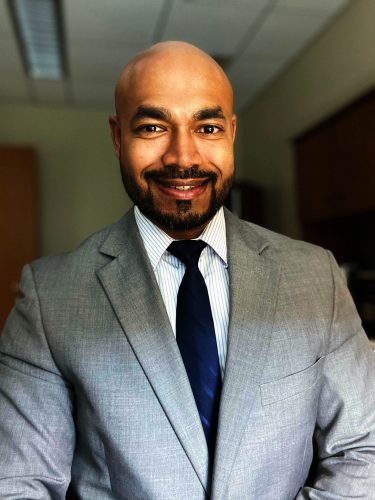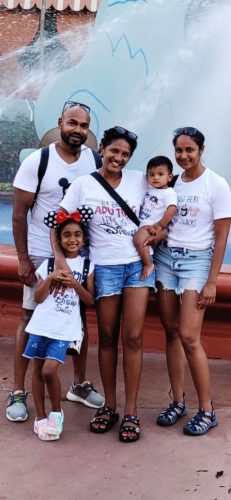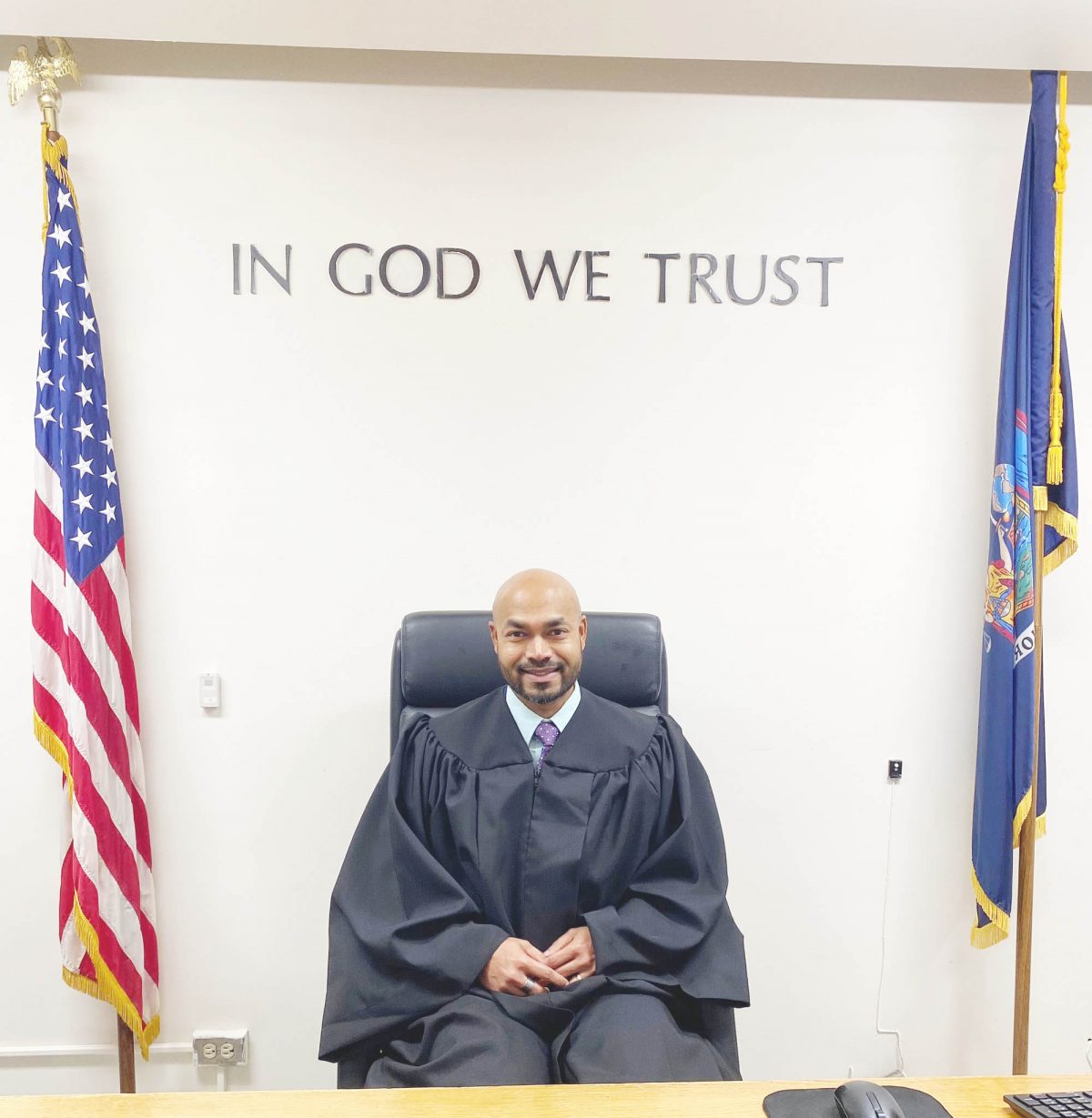Hari Singh knew he wanted to be a lawyer from around the age of six but even though this dream became a reality years later, it took him moving to the US to get what he called a “baptism by fire” in court experience which shaped the trajectory of his career to where he is today.
In February, Singh became one of ten judges appointed to the bench by New York City Mayor Eric Adams and one of the first two South Asian judges to be appointed to the New York City Family Court.
He has been appointed to the family court, an area in which he has much experience as he worked in the New York City Administration for Children’s Services as a team leader. For the last seven years, he served with the New York State Unified Court System as a senior court attorney and, most recently, as principal court attorney to the supervising judge of Queens County Family Court.

Prior to moving to the US from Guyana, the former Central Corentyne Secondary student was employed with the Ministry of Foreign Affairs as a legal officer before becoming the legal advisor to the Permanent Mission to the United Nations.
In his new role, Judge Singh said, the driving force behind his work is public service as he recalled that both of his parents – his mother as a school teacher and an education officer and his father a police officer – gave yeoman service to this country.
“They were committed public servants and I think growing up I wanted to work with the government as well.
It just happens that working with families is my calling to be in public service and I am absolutely enjoy mediating family cases and resolving them and keeping family units together,” the judge said during a virtual interview from his New York office.
Addressing the “myth” that family courts only rule in favour of women, he said there are a lot of fathers who come to court and “are dying to see their children”. He added, “There is the perception out there that a woman can take better care of the kids but you would be shocked that fathers, if given the right chance and the right opportunities, what great parents they can make”.
Judge Singh said in addition to ensuring that children are safe he also wants them to have connection with both parents and to the extent that there is a willing man out there who wants to see his child, “I will ensure that that man gets every chance legally available to him”.
Working in the family court system, Judge Singh said, frustration is just one of the emotions he feels. At times one can get annoyed, sad, upset when hearing cases, he said, but one of the things he learnt when he became a litigator with children’s services is that “it is never what you see but what you have learnt from asking questions.
“So once you have everyone appear before you and you start asking questions and you probe to find out why the case is what it is, sometimes you get a better understanding of what families are going through and then it helps to take care of that frustration…”
He added that in New York there are a host of services to support children and families but there are times when families have to be convinced that they need the services; with those who cannot be convinced, the judge has to make an order.
“Part of being a judge is also being a social worker as you have to understand what a family really needs and you have to really connect with people. I think it helps that I am a man… of colour… Family court in New York City is predominantly people of colour so I would have frank discussions with families,” Judge Singh said.
It helps that he did not come to the position in a vacuum but from being an active member of his community which has helped him. He also has a young family, his daughter is six and his son is just over a year old.

About six
Judge Singh shared that he was about six when he went visiting with his paternal grandfather and he believes it was because of his many interruptions that his grandfather’s friend asked him what he wanted to be when he grew up. He said he wanted to be a lawyer and his paternal grandfather became a major influence as he wanted a lawyer in the family.
“Hearing that from him made it easy for me to choose a career at that age so I was like ‘oh I am going to be a lawyer when I grow up’,” he said.
After secondary school he moved to the University of Guyana and later the Hugh Wooding Law School. Because he studied on a scholarship, he had to work with the government on completion of his studies and anticipated being placed at the Office of the Director of Public Prosecutions or the Attorney General’s Chambers, as he wanted his day in court so to speak. He said he wanted to put his debating skills to the test but that was not to be because he was sent to the Ministry of Foreign Affairs.
“What am I going to be doing there?” he recalled asking himself.He was dejected but working with the then minister of Foreign Affairs Rudy Insanally and Director General Elisabeth Harper, who were very supportive, his experience was interesting as he was given the task of examining the country’s international agreements.
He then examined the local statutes to ascertain where the country was lacking compliance and also to advise how the country can conform to the agreements.
“So it was a big project and part of it was to come up to compliance with our reporting obligations under the human rights treaties…,” he said, adding that he worked with a consultant from the United Nations.
All of this, coupled with a supportive environment, meant that he “fell in love” with the ministry as the challenge was there and while it was not the field of law he was familiar with, he learnt as he worked. So much so he returned to the University of Guyana where he did postgraduate international studies.
Wanting to be more suitable academically to the field he was in, Judge Singh said, he later completed a masters degree in International Human Rights Law at Lund University in Sweden. By then, he had become the head of the legal and treaties division at the ministry. But he later moved to the United Nations; his contractual arrangement with the government came to an end in 2009 and he migrated to the US.
He remained at the Permanent Mission for a while, then had a brief stint with an immigration law firm.
Hard to find a job
Even though he found it difficult to find a job at that time, Judge Singh said, he volunteered a lot as if it was a full-time job which saw him in the housing court, civil court where he helped people with consumers’ debt issues and he was also in the family court.
“Mind you, this was the first time I was going into an actual courtroom,” he recalled.
Following numerous applications he was successful at joining the Administration for Children’s Services and he loved it. The family courts deal with everything that concerns a family except for divorces.
“Practising in New York was baptism by fire but I ran with it. One of the things coming from Guyana is that you don’t back down when there is a fight but you roll with the punches and you learn and co-exist or try to super exist,” he said.
He did ‘super exist’ as he moved on to become a trial supervisor at the administration and was later hired as a court attorney for one of the judges he had appeared before as a trial supervisor. He worked in this position for about six years and he described his responsibilities as being a gatekeeper for the judge; he managed the cases and the ones that go before the judge are those that have to be tried where the attorneys would not agree on anything.
It meant that he met with attorneys and their clients and he negotiated.
“I really liked it… It just happened that family court deals with so many of the human rights issues that I also had a passion for, that I studied for so it was an intersection of those two main interests, litigating and litigating human rights-based issues,” he shared.
He later became the supervising court attorney in Queens as his judge was about to retire. He supervised all the other court attorneys but also played a part in running the court house itself.
Always aspire
Judge Singh said he always aspires to do better at whatever field he is in and for him the next step was being on the bench. It is done through appointment or being elected and he angled to get there by either means. He joined the Bronx Democratic Party and became very involved with his community board in the Bronx where he lived and he was also politically involved and at the same time he was also angling to be appointed.
When he put in his application, Judge Gilbert Taylor was one of his mentors and he guided him through the process. After being prepped for the interviews he was shortlisted and then appointed.
“Sometimes I still turn around when somebody says judge, like, ‘are you referring to me?’” he said, adding that it had been in the making ever since he became a court attorney.
Looking to the future, Judge Singh does not rule out returning to Guyana but he said whatever he does he will be working with people and continuing his public service.
“I say that to say Guyana is my home, Guyana is where I am from and so I am not saying I may never return to Guyana,” he said.
Judges are appointed for ten-year terms and they retire at 70. Judge Singh is currently completing the term of someone who reached the age of retirement, following which he will seek to be appointed for ten years. The appointment is not automatic; there are constant reviews of judges and if one comes up for reappointment and doesn’t have a good track record, the reappointment may not occur.
Singh is the fourth of five children, he has three older brothers and a younger sister who is also an attorney and lives in the US. His parents live in the US as well and his older brothers live in other countries.
He encourages especially the young to always maintain respect and never pretend to be better than anyone else.


